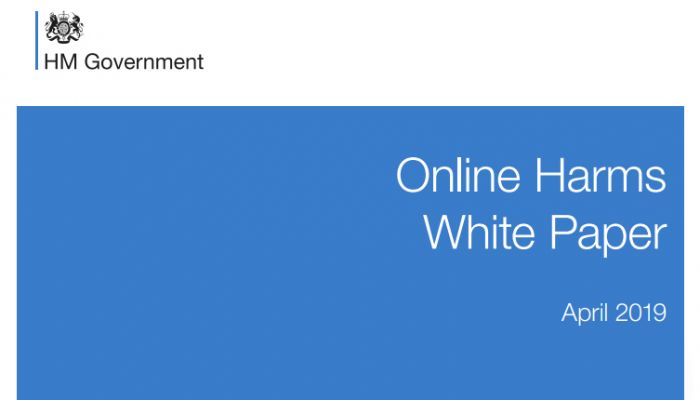Reaction to Government proposals to tackle ‘online harms’
The Government has published a white paper that proposes a new regulator to oversee and enforce a ‘statutory duty of care’ by online tech companies. Enforcement includes the ability to issue ‘substantial fines’ and to ‘impose liability on individual members of senior management’.
The detailed white paper proposals draw a particular focus to terrorist activity and child sexual exploitation and abuse online, and say the Home Secretary would have final sign-off on the codes of practice that govern these harms. In what may be seen as a big threat to social and search giants’ proprietary practices, the proposals also call for the regulator to have the ability to see the impact of algorithms in selecting content for users.
This white paper comes off the back of Mark Zuckerberg calling for government regulation of the internet – and though cynics may suggest a tech boss requesting specific regulation is not as wholesome as it appears, ‘harmful content’ is an area he wants more regulation over. Of course, having read the Government’s white paper, Zuckerberg may now regret inviting this in to his company’s ethos.
Reaction to the proposals has been mixed, with many questioning the ethics of Government intervention in online spaces in what could be perceived as an attack on free speech. The fact the white paper claims it has a vision for ‘a free, open and secure internet’ with ‘freedom of expression online’, seems in many ways to directly contradict the requirement for tech companies to actively remove harmful content.
The Guardian has summarised many of the fears around the proposals here, which includes the line, ‘critics say online harms white paper could lead to North Korean-style censorship’.
These concerns were reflected across Twitter:
Even smaller voice: Have they any inkling how big the Internet is?
— David Banks (@DBanksy) April 8, 2019
Though the voices in the media may not fully reflect the public’s perception (imagine), as this Martin Lewis Twitter poll suggests:
Today’s Twitter Poll: Do u support the govt’s proposal today, to set up a formal UK regulator of social media & the internet; to govern online harms (inc child sex abuse, hate crimes, harassment, sale of illegal goods). Critics say ending self-regulation is worrying censorship.
— Martin Lewis (@MartinSLewis) April 8, 2019
It’s very possible that the high-profile stories of tech giants and social platforms accused of failing their users, such as in the death of Molly Russell, have perhaps permeated the public’s collective conscience more than the media’s ingrained fear of Government censorship.
In PR land, the reaction has not been as strong, which is perhaps surprising as media concerns are typically comms concerns. The difficulties of strongly taking one side (Government potentially threatening freedom of speech) against another (we want children to be safe online) is summed up by the PRCA’s director general, Francis Ingham; he said: ‘The Online Harms White Paper builds on the political consensus around online safety, public concern, and the need to “rebuild” public confidence. The question of online platform regulation touches on sensitive subjects such as freedom of speech and our shared desire to keep people (especially children) safe online.
‘The devil is in the detail here and the Government itself argues that voluntary action from the industry has not “gone far enough”. While most people would support the intentions behind this White Paper, if all of these online harms are not clearly defined then the consequence would be far larger than intended.’
The CIPR similarly highlights that in theory this white paper is a positive step to protect people online but that any regulation must also allow tech companies to operate freely, a tightrope balancing act. Jon Gerlis, CIPR senior policy office, said: ‘This Paper is a welcome addition to the conversation around tackling the ills of harmful online content and the spread of disinformation online. The paper accepts that self-regulation has failed.
‘It is therefore right that the law addresses this in a way that allows it to keep pace with advances in the digital world and ensure tech companies operate freely but regulated to a clear set of standards expected of any other kind of business.’
What do you think of the regulation? Long overdue to keep people safe or the end of freedom of speech? Let us know on Twitter @Vuelio.





Leave a Comment